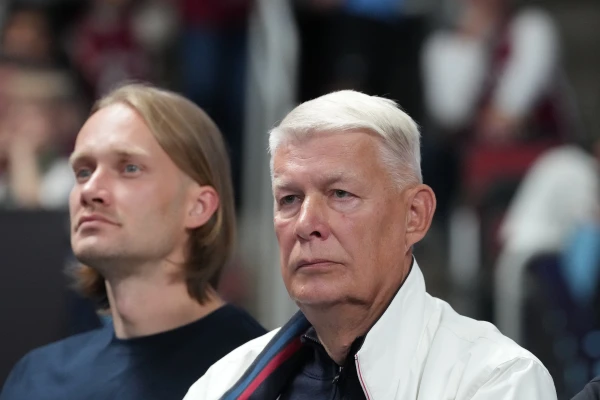
The overall concept of the government is as follows: starting from 2027, all professions not associated with a regular threat to health and life may be excluded from the circle of recipients of pensions for length of service.
But the Latvian government supported important amendments regarding pensions for length of service last week: "special" pensions for judges and prosecutors were introduced; "length of service" for cultural workers was slightly cut, and the required service period for ambulance workers was increased.
New Pension Rules for Ambulance Workers: Union Opposes
For the employees of the Emergency Medical Service (NMPD), the required length of service for pension eligibility is planned to be gradually increased by five years - from the previous 20 to 25 years.
There is also a requirement that "the last 10 years before retirement must be worked in the ambulance service" - this is stated in the amendments to the law "On Age Pensions for Employees Engaged in Emergency Medical Assistance," prepared by the Ministry of Health (VM) and supported by the government.
The head of the Latvian Health and Social Care Workers' Union (LVSADA), Valdis Keris, has already categorically opposed this innovation.
According to him, there was no "reasonable dialogue" about the changes, and not all proposals from the union were taken into account. These changes will deter people from working in the ambulance service.
"We cannot support such a bill," the union leader concluded.
"Already now, due to a lack of workers, elderly people die waiting for help, while the ambulance service tries to blame outsiders who are nearby and do not provide emergency assistance," Keris said at the hearings, "and if government representatives are not ready to provide each other with resuscitation measures, then we strongly suggest not to engage in such nonsense," said the LVSADA chairman.
In response to his remarks, Prime Minister Evika Silina noted that "ambulance workers are not having their length of service pensions taken away, so these accusations are unfounded. And the director of the NMPD, Liene Cipule, agreed with this proposal."
In the Cultural Sector: Length of Service Pensions Remain for Now
The amendments for length of service pensions prepared by the Ministry of Culture also foresee a gradual increase in the retirement age and work experience. At the same time, a reduction in the amount of length of service pensions has been announced.
Who these "special" pensions currently apply to:
- employees of state and municipal professional orchestras, choirs, concert organizations, theater and circus artists, and ballet dancers.
In this regard, Prime Minister Evika Silina expressed dissatisfaction and reminded the Minister of Culture that length of service pensions should apply to employees in operational work, military, and law enforcement: "The issue of pensions for cultural workers needs to be approached differently!" And she expressed hope that a different solution would be found by the second reading of the law in the Saeima. According to her, "it is difficult for the public to understand why these pensions are maintained."
For now, the proposal is as follows: for cultural workers, starting from January 1, 2027, the minimum retirement age and required work experience will be gradually increased by 5 years - by six months each year. At the same time, the procedure for calculating and paying pensions will change.
When calculating the pension, a 10-year work experience that ends two months before leaving the position will be taken into account, and the minimum pension amount is set at 45% of the average salary - this is ten percent less than before.
Currently, in the cultural sector, 208 people receive a "length of service pension," or less than 2% of the total number of "length of service" recipients, and the average pension amount is 761 euros. The total state expenditure on pensions for the elderly in the cultural sector is about 1.8 million euros per year or 1.5% of the total amount of length of service pensions in Latvia.
On "Special Pensions" for Judges and Prosecutors
The government has adopted amendments that provide for the payment of "special pensions" to judges and prosecutors after the age of 65 in 2027. These "special pensions" will be much larger than the average in Latvia, as they are calculated using a more favorable formula.
Justice Minister Inese Libina-Egnere explained: these changes should be viewed as a fair proposal: "We in the ministry have developed such a proposal for judges and prosecutors, and the Cabinet of Ministers supported it." According to the minister, for prosecutors, this leap in retirement age is quite significant, as prosecutors can currently retire at the age of 50.
"Yes, the work of judges and prosecutors is very important, and at the same time, it does not pose a danger to life and health. Therefore, the uniform requirements stipulate that both judges and prosecutors can receive a special pension from the age of 65," emphasized Libina-Egnere.
About the amounts of "special pensions" for judges and prosecutors:
-
judges and the ombudsman will be assigned a special pension of 55% of the average monthly salary, and for each year of service exceeding 25 years, it will increase by 2% of the salary;
-
prosecutors will be assigned a special pension of 45% of the average monthly salary, and for each year of service exceeding 25 years, it will be increased by 2% of the salary;
-
the maximum amount of the special pension should not exceed 70% of the salary. The pension calculation will be based on the average monthly salary for the last 120 months, that is, for 10 years.
Who will be entitled to these special pensions:
-
individuals with 25 years of work experience, of which the last 10 years were spent in the positions of judge, prosecutor, or ombudsman, and who have reached the age specified in the Law on State Pensions for the appointment of old-age pensions, will be entitled to a special pension if the individual was dismissed from the position of judge or ombudsman voluntarily or due to age;
-
an individual who, regardless of age, was dismissed from the position of judge, ombudsman, or prosecutor due to health reasons, but whose experience is at least 25 years, of which the last 3 years the person worked as a judge or prosecutor, or ombudsman.
Ministry of Internal Affairs and KNAB: Also Changes
The retirement age for employees of the Ministry of Internal Affairs will be increased by 5 years starting in 2027. However, the pension reform will not affect those who have already acquired the right to a length of service pension.
If a person has work experience from 10 to 15 years before January 1, 2027, the retirement age will be gradually increased by 5 years - by 6 months each year. At the same time, an assessment is underway regarding which positions will retain the retirement age of 50 years.
The amendments also stipulate that the work experience of officials of the Corruption Prevention and Combating Bureau (KNAB) will be increased by 6 months each year until it increases by 5 years. The minimum retirement age will also be gradually increased by 6 months each year until it increases by 5 years.














